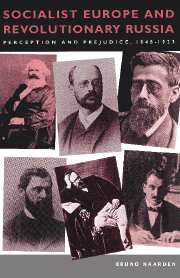Book contents
- Frontmatter
- Contents
- Introduction
- 1 The Western European image of Russia
- 2 Russian and European socialists
- 3 Russian and Western social democracy 1890–1905
- 4 1905: a failed revolution in Russia
- 5 Intermezzo 1906–1918
- 6 Socialist Europe and the October revolution 1918–1919
- 7 Social democracy in Soviet Russia and the continuation of the debate about communism in 1919–1920
- 8 1920–1921: division in the West, uprising and famine in Russia
- 9 1921–1923: the eclipse of the socialist centre in the West and the decline of democratic socialism in Soviet Russia
- Conclusion
- Notes
- Bibliography
- Index
- Frontmatter
- Contents
- Introduction
- 1 The Western European image of Russia
- 2 Russian and European socialists
- 3 Russian and Western social democracy 1890–1905
- 4 1905: a failed revolution in Russia
- 5 Intermezzo 1906–1918
- 6 Socialist Europe and the October revolution 1918–1919
- 7 Social democracy in Soviet Russia and the continuation of the debate about communism in 1919–1920
- 8 1920–1921: division in the West, uprising and famine in Russia
- 9 1921–1923: the eclipse of the socialist centre in the West and the decline of democratic socialism in Soviet Russia
- Conclusion
- Notes
- Bibliography
- Index
Summary
The peace and quiet in Germany and Russia was deceptive and Europe was granted only a short pause for breath. Nevertheless, around 1923 an era was brought to an end. In the years 1917–23 the traditions of rebellion and resistance, which had come into being in 1789, made themselves felt in our part of the world on a grand scale for the last time. Only in Russia did the revolution continue and the result was not only that the Western labour movement split apart, but also that Europe became divided into two camps. Eventually the contrast between communism on the one hand and socialism and capitalism on the other caused a dichotomy the like of which had not been seen since the sixteenth-century Reformation. The confused quarrel between Martov and Lenin at the Second Party Congress in 1903 was thus followed by an unexpected development which was by no means concluded in 1923. Nevertheless, Martov's death in 1923 and that of Lenin in January 1924 certainly marked the end of an era. The Russian communist party, which had experienced a considerable transformation in the years 1917–23, was only afterwards to undergo a complete metamorphosis. Stalin's bureaucratic Moloch no longer in any way resembled the revolutionary vanguard which Lenin had drawn up on paper in 1902. In 1923 democratic socialism was as good as dead in Russia. In the West it would continue to exist, though its significance would be greatly altered.
- Type
- Chapter
- Information
- Socialist Europe and Revolutionary RussiaPerception and Prejudice 1848–1923, pp. 515 - 521Publisher: Cambridge University PressPrint publication year: 1992



